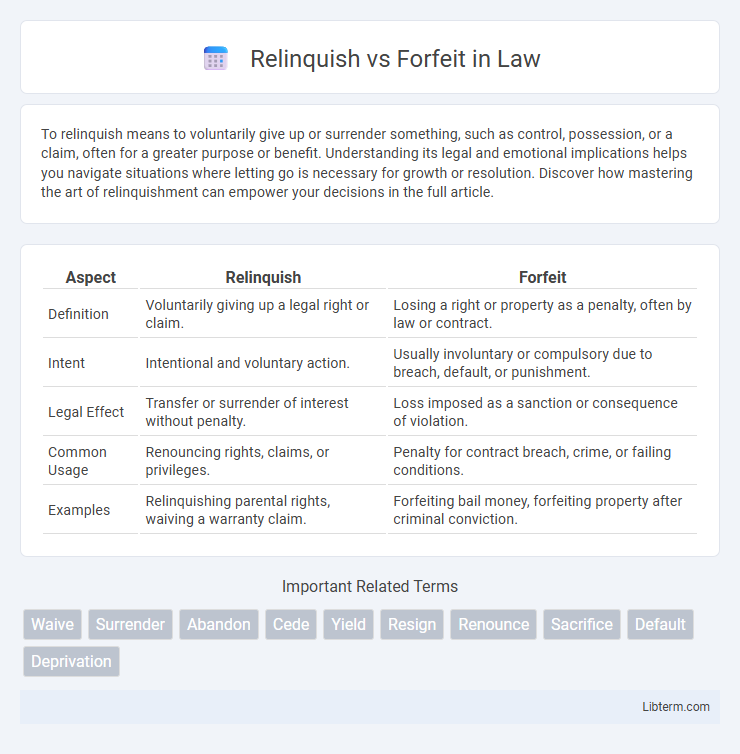To relinquish means to voluntarily give up or surrender something, such as control, possession, or a claim, often for a greater purpose or benefit. Understanding its legal and emotional implications helps you navigate situations where letting go is necessary for growth or resolution. Discover how mastering the art of relinquishment can empower your decisions in the full article.
Table of Comparison
| Aspect | Relinquish | Forfeit |
|---|---|---|
| Definition | Voluntarily giving up a legal right or claim. | Losing a right or property as a penalty, often by law or contract. |
| Intent | Intentional and voluntary action. | Usually involuntary or compulsory due to breach, default, or punishment. |
| Legal Effect | Transfer or surrender of interest without penalty. | Loss imposed as a sanction or consequence of violation. |
| Common Usage | Renouncing rights, claims, or privileges. | Penalty for contract breach, crime, or failing conditions. |
| Examples | Relinquishing parental rights, waiving a warranty claim. | Forfeiting bail money, forfeiting property after criminal conviction. |
Understanding Relinquish and Forfeit: Key Definitions
Relinquish means voluntarily giving up a right, claim, or possession, often implying a deliberate decision to surrender control or ownership. Forfeit involves losing something as a penalty or consequence, typically due to a breach of rules, law, or agreement. Understanding these key definitions highlights that relinquish emphasizes voluntary surrender, while forfeit centers on compulsory loss.
Etymology: Origins of Relinquish and Forfeit
Relinquish originates from the Latin word "relinquere," meaning "to leave behind" or "abandon," highlighting a voluntary act of giving up possession or control. Forfeit derives from the Old French term "forfet," which stems from the Latin "foris facere," meaning "to do outside the law," emphasizing a penalty or loss due to wrongdoing or breach of rules. Understanding these etymological roots clarifies the nuanced difference: relinquish involves intentional surrender, while forfeit implies involuntary loss as a consequence.
Core Differences Between Relinquish and Forfeit
Relinquish involves voluntarily giving up a right, claim, or possession often without coercion or penalty, emphasizing a conscious choice. Forfeit refers to losing something as a consequence of a breach, failure, or penalty, implying an involuntary loss imposed by rules or law. The core difference lies in relinquish being a deliberate surrender, whereas forfeit is a forced loss due to conditions or violations.
Legal Contexts: Relinquish vs Forfeit
Relinquish in legal contexts refers to voluntarily giving up a right, claim, or property without receiving compensation, often through a formal declaration or contract. Forfeit involves the involuntary loss of rights, property, or privileges as a penalty for violating a law, regulation, or contractual term, typically enforced by a court or authority. While relinquishment is consensual and deliberate, forfeiture is coercive and punitive, frequently resulting in permanent deprivation.
Relinquish in Everyday Usage
Relinquish in everyday usage typically refers to voluntarily giving up possession, control, or claim to something, often implying a conscious and deliberate decision. Unlike forfeit, which suggests losing something as a penalty or consequence, relinquish emphasizes a willing and intentional release of rights or responsibilities. Common contexts include relinquishing control over assets, relinquishing custody, or relinquishing privileges without external compulsion.
Forfeit: Common Scenarios and Examples
Forfeit typically refers to the loss of rights, property, or money as a penalty for wrongdoing or failure to meet obligations, commonly seen in legal cases, sports, and contracts. In sports, a team may forfeit a game due to insufficient players or rule violations, resulting in an automatic loss and possible fines. In contracts, parties may forfeit deposits or payments if they breach terms, exemplified by renters losing security deposits for property damage.
Voluntary vs Involuntary Actions Explained
Relinquish refers to voluntarily giving up possession, control, or rights over something, often implying a conscious decision or consent. Forfeit involves losing something, typically as a penalty or consequence, resulting from a failure, error, or violation, making it an involuntary action. Understanding the distinction lies in recognizing relinquishment as an intentional surrender, whereas forfeiture occurs due to external enforcement or unavoidable conditions.
Synonyms and Related Terms
Relinquish and forfeit both involve giving up something, but relinquish implies a voluntary release or surrender, whereas forfeit denotes a loss often due to a penalty or failure to meet conditions. Synonyms for relinquish include surrender, renounce, and yield, highlighting deliberate decision-making. Forfeit is closely related to lose, sacrifice, and forgo, emphasizing involuntary deprivation or forfeiture.
Relinquish vs Forfeit in Finance and Business
In finance and business, relinquish refers to voluntarily giving up rights, claims, or assets without coercion, often for strategic purposes like relinquishing control over a subsidiary or relinquishing a contract. Forfeit involves losing assets, rights, or money as a penalty due to breach of contract, default, or failure to meet obligations, such as forfeiting a deposit after contract termination. Understanding the distinction between relinquish and forfeit is crucial for contract management and risk assessment.
Choosing the Right Word: Practical Tips
Choosing between relinquish and forfeit depends on the context of voluntary or involuntary loss. Relinquish implies a deliberate decision to give up control or possession, often used in legal or formal settings. Forfeit conveys losing something as a penalty or consequence, emphasizing involuntary surrender due to rules or conditions.
Relinquish Infographic

 libterm.com
libterm.com